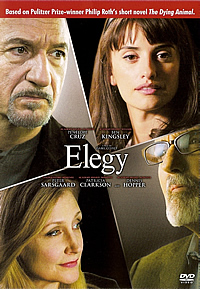SYNOPSIS:
Charismatic professor David Kepesh (Ben Kingsley)
glories in the pursuit of adventurous female students but
never lets any woman get too close. When gorgeous Consuela
(Penelope Cruz) enters his classroom, his protective veneer
dissolves. Her raven-haired beauty both captivates and unsettles
him.
Even
if Kepesh declares her body a perfect work of art, Consuela
is more than an object of desire. She has a strong sense of
herself and an emotional intensity that challenges his preconceptions.
Kepesh's need for Consuela becomes an obsession, but ultimately
his jealous fantasies of betrayal drive her away.
Shattered,
Kepesh faces up to the ravages of time, immersing himself
in work and confronting the loss of old friends. Then, two
years later, Consuela comes back into his life with an urgent,
desperate request that will change everything.
MOVIE REVIEW:
Philip
Roth is no easy author to read, let alone adapt, and Elegy
is admirable in its ambition for trying. Based on his recent
novel “The Dying Animal”, it tells of the doomed-to-fail
love affair between an older man David Kepesh (Ben Kingsley)
and younger woman Consuela Castillo (Penelope Cruz).
Those
familiar with Roth’s work will recognise his all-too
familiar theme of younger babes falling for older, wiser intellectual
men in this story, and also the use of protagonist David Kepesh.
“The Dying Animal” was a novella that came after
his much lauded three novels dubbed the “American Trilogy”
and was generally regarded as less outstanding. Yet with the
inevitable comparison of novel and film, this adaptation proves
the novel is still far superior.
The most
obvious shortcoming of screenwriter Nicholas Meyer’s
adaptation is in its portrayal of Kepesh. The Kepesh in Elegy
and the Kepesh in Roth’s novel are unfortunately opposites-
in the novel, Kepesh is sad and filled with self-loathing,
whereas in Elegy, Kepesh comes across as thoughtful and ruminative.
It is this difference that takes much of the punch out of
the film, that makes Elegy an unfortunate tame affair next
to its livelier source material.
Where
is the passion between Kepesh and Consuela? Where is that
passion that captivated Kepesh so, made him obsessed with
Consuela and turned him into a fragile slave for love? Much
of it is hinted but never expressed, nor felt by its audience,
in the movie. And hence, Kepesh’s subsequent transformation
is never fully convincing- a result of the film’s inability
to allow its audience to get under the skin of its most important
character.
Where
the movie does succeed however is in its meditation on the
passage of time in our lives. As Kepesh himself aptly puts
it in the movie, time passes away when we’re not looking.
Director Isbael Coixet makes this point first through Kepesh’s
refusal to admit that age has caught up with him; and then
by Kepesh’s sudden dawning of mortality as observed
through his closest friends.
Elegy
is also boosted by some fine performances from its actors.
In particular, Penelope Cruz is a revelation as the beautiful,
self-confident Consuela and she is especially heartbreaking
when the story takes a surprisingly sombre turn towards the
end. Ben Kingsley is always a delight to watch but one wonders
how a less restrained performance as Kepesh would have worked
to make this film much more energetic.
Admirable
is probably the best word to describe this adaptation that
never quite achieves the emotional resonance that it should
have. It’s never easy translating Roth for the big screen-
Elegy joins the list of such films like The Human Stain or
Goodbye Columbus that never quite made that leap successfully.
SPECIAL FEATURES:
Commentary with screenwriter Nicholas Meyer:
Meyer talks as if he’s giving a lecture in a screenwriting
class about how to adapt a book for the big screen. Unfortunately,
this commentary is neither insightful nor interesting.
"The Poetry of Elegy" Featurette:
The principal cast and director of the film, Isabel Coixet,
share their thoughts on what the film is about, as well as
what their respective characters represent in the film.
AUDIO/VISUAL:
This
mostly talky picture is surprisingly presented in Dolby 5.1
audio- though there’s little in the film itself to make
this an arresting experience. Visually, the images are crisp
and clear.
MOVIE RATING:
  
DVD
RATING:
 
Review by Gabriel Chong
Posted on 26 May 2009
|


